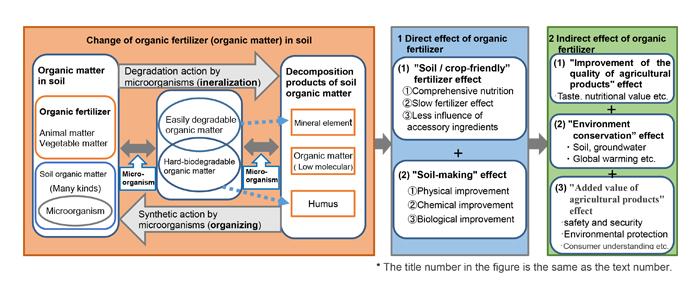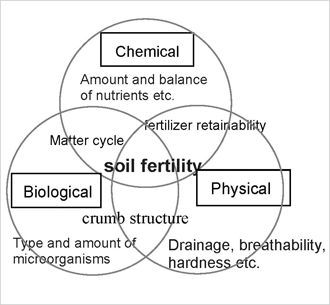
・Daito Fertilizer Co., Ltd. acts as a fertilizer manufacturer mainly compound fertilizers, especially as a major feature of the production of organic compounding fertilizer using "organic fertilizer" as a raw material.
・"Organic fertilizer" has many merits of use. Our motto "earth creation" contains the desire to contribute to the creation of a recycling-oriented society that makes full use of the merits of organic fertilizer in agriculture.
・The following is a summary of the characteristics of "organic fertilizer".
・There are many kinds of fertilizer (ordinary fertilizer prescribed by the fertilizer regulation law), but it can be roughly classified into "chemical fertilizer" and "organic fertilizer".
Also, organic fertilizers include those derived from animals and those derived from plants.

・Historically it is not an overstatement to say that chemical fertilizer has greatly enhanced the productivity of agriculture and has become a major force in overcoming food shortages and other problems in the postwar period in Japan and has supported the Japanese economy.
・However, it is also true that agricultural production in recent years is heavily dependent on chemical fertilizers. Productivity was improved, but it is also true that the productivity of "soil" that is the foundation of agriculture = "soil fertility" declined, and the influence on the global environment such as groundwater pollution by chemical fertilizer appeared.
・Based on these reflections, there is now a need for "environment conservation type agriculture", "recycling type agriculture" and "safe and reliable agriculture" that do not rely excessively on chemical fertilizers. And the farmers working on them are dramatically increasing.
・For these efforts, "organic fertilizer" which is a substitute for "chemical fertilizer" is an effective material.
・However, it is important to understand and properly use the characteristics of "organic fertilizer".

Although organic fertilizers have various characteristics, their characteristics can be expected to have a "direct effect" on the soil, and "indirect effects" can be brought about.
①Comprehensive nutritional supply effect (nutrient type, balance) Organic fertilizer is a product of natural circulation. Plant-derived organic matter is a product originally ingested nutrients in the soil in the kind and balance necessary for the plants, and the animals were grown up with that plant as a food. Unlike chemical fertilizers, it contains all the nutrients necessary for crops in a balanced manner.
②Slow fertilizer effect (manifestation of fertilizer effect close to the growth rate of crops)
Most of the organic fertilizer is used in the soil, it is decomposed by the microorganisms in the soil and then absorbed by the plant. On the other hand, most chemical fertilizers are absorbed by plants as they dissolve in water.
This gentle fertilizer effect suppresses the rapid growth of crops and helps protect the environment to groundwater by reducing excess (waste) fertilizer that crops do not absorb.
③Effect of avoiding soil deterioration by components other than fertilizer nutrients In the case of most chemical fertilizers, all of the ingredients contained are not fertilizer nutrients but contain the ingredients (main ingredients) required by the crop plants and the ingredients (minor ingredients) which are not needed, and this minor ingredient is mixed with the soil It may remain inside and cause soil deterioration. Organic fertilizer does not contain such subcomponents, almost all components naturally return.

・When organic fertilizer is used for soil, it is decomposed by microorganisms and used as agricultural crop as nutrients such as nitrogen, phosphoric acid and potassium, but organic components which are hard to decompose are "humus" and remain in the soil. This "humus" becomes the "source of soil making".
・The purpose of making soil is to raise “soil fertility”, but the three main factors that determine “soil fertility” are "physical", "chemical" and "biological" of soil.
・When organic fertilizer is used for soil, it is decomposed by microorganisms and used as agricultural crop as nutrients such as nitrogen, phosphoric acid and potassium, but organic components which are hard to decompose are "humus" and remain in the soil. This "humus" becomes the "source of soil making".
・"Humus" supplied from organic fertilizer acts effectively on these three factors.
①Soil physicality and humus
The physical properties of the soil are based on the soil's "crumb structure" due to the softness of the soil (directly related to the elongation of the roots of the crop), drainage properties and breathability. "Humus" is a substance necessary to form this "crumb structure". If "humus" runs short, "Grain refining" occurs rather than "Aggregation", and soil physical properties It will get worse.
②Soil chemistry and humus
The chemical nature of soil is the kind, amount, balance, etc. of
soil nutrition, so the nutrients in the fertilizer have a direct
influence on the chemical nature of the soil.
"Humus" has the greatest influence on fertilizer retainability of soil, CEC (cation exchange capacity) representing soil's fertilizer retainability is much larger than soil, and soil fertilizer retainability improving effect is recognized.
The soil where humus is suitably contained is also good fertilizer retainability, it can be said that soil is easy to control nutrition.
③ Soil biology and humus
Soil biology is the type and number of inhabiting microorganisms in the soil. Depending on the type of microorganisms, it may be a causative factor of bad crop diseases (bad bacteria), but usually it plays a major role to support material circulation by affecting decomposition, synthesis, morphological change etc. of substances contained in the soil It is (good bacteria).
Soil microorganisms that play these roles mainly live in "humus" and propagate with "humus" as a feed, so if the use of organic matter is small, the humus content in soil decreases and the number of microorganisms Also decreases.
・As a result of the "soil / crop-friendly fertilizer effect" and "soil-making effect" by the above organic fertilizer, You can also expect the following indirect effects.
(1)"Improvement of the quality of agricultural products" effect
In general, it is said that the use of organic fertilizers improves the quality (nutritional value and taste) of
agricultural products, compared to using only chemical fertilizers.
When not only organic fertilizers but also organic matter such as compost are appropriately used, nutrients such as nitrogen can be slowly supplied compared to chemical fertilizers, nutrient absorption corresponding to the cultivated amount of agricultural products will be carried out I will. In addition, the water retention and permeability of the soil by organic matter (humus) also improves, and a stable supply of water is maintained.
These are considered to be factors for quality improvement.
(2)"Environment conservation" effect
The slow fertilizer effect that is characteristic of organic fertilizer helps environmental conservation.
By slowly supplying fertilizer nutrients to crops, the absorption rate is improved compared to chemical fertilizers, and nutrients are less likely to remain in the soil, so deterioration of soil chemistry and adverse effects on groundwater are reduced.
In addition, many chemical fertilizer raw materials are derived from petroleum, resulting in the generation of global warming gases such as CO2. However, the use of organic fertilizer leads to the suppression of greenhouse gas emissions.For the same reason, it also leads to preservation of earth resources such as oil.
(3)"Added value of agricultural products" effect
For agricultural products raised with organic fertilizer, added value can be expected in terms of quality and safety and security required by consumers. "Organic farm products" and "special cultivated agricultural products" are cases using the certification system, but by working in the whole region, we can expect not only quality but environmental conservation effect. In addition, it will be possible to deepen the understanding of consumers about agriculture and to add value to agricultural products.
Technology Dissemination Department
Daito Fertilizer Co., Ltd.